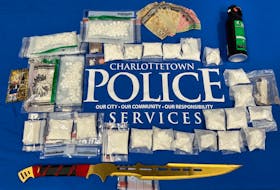ALBERTON
Fairs and exhibitions on P.E.I. are starting to brace themselves for federal legislation and regulatory changes that could impact their operation.
Paul Jackson, president of the Prince Edward Island Association of Exhibitions gave a summary of some of the proposed changes during the association’s annual general meeting. Representatives for fairs from all over P.E.I. were in attendance.
Bill S-228, being debated in the House of Commons, is intended to regulate the promotion of food deemed unhealthy for children under the age of 17.
How that will roll out still hasn’t been finalized, Jackson admits, but he suggested there will likely be restrictions on advertising and promotion of certain food items.
There are also regulatory changes in the works that could impact the showing of livestock at agricultural fairs. Jackson sand the Canadian Food Inspection Agency has indicated it wants to strengthen regulation with regard to animal traceability.
“It’s all for traceability of disease,” summarized Prince County Exhibition president Jason Rayner in pointing out he understands where CFIA is coming from. “If an animal is sick six months down the road, they want to know exactly where that animal has been.”
But he is concerned it is going to make for a whole lot of additional paperwork for fairs’ staff to compile.
Jackson said the CFIA changes are still in the early stages and will not likely impact fairs until at least 2019.
“A lot of paperwork to volunteer organizations is our biggest issue with it,” Jackson said, noting the initial description has CFIA wanting the information within seven days of the fair.
“A lot of your volunteers are trying to get a little bit of rest and what-not and for somebody to have to sit down and go through all this, I think it’s a little much. They need to extend this a little bit.”
While the timeline for regulations dealing with restricting promotion of foods deemed unhealthy for youth is still not set, Jackson suggests implementation is likely to occur sooner than the traceability changes.
Still, he believes there needs to be more clarity around what is meant by promotion and marketing of unhealthy foods, and around what foods will be deemed unhealthy. Jackson suggests food is likely second or third on the list of attractions for fair-goers. If suppliers feel they will be unable to promote their food items at the fair, they might choose not to attend. “That’s going to have an impact on the financial results of the fair, for sure.”
Marlene Campbell with Culture Summerside, operators of the Summerside Lobster Festival, said traceability will not be an issue there as they don’t have livestock on display.
As for food items that Bill S-228 might target, Campbell said the Lobster festival is “proceeding as normal until we know more details.”
As for food items, she said lobster is the festival’s main food item. “You can’t get (healthier) than lobster.”
Jackson points out the restrictions don’t target fairs specifically, but he feels those events could feel the pinch. Because they only run a few days a year, he said fairs would sometimes rely on infrastructure, such as pop coolers, loaned by a supplier. He wonders how interested a pop company might be in loaning a pop cooler if it were required to cover al lof its company logos and not be permitted to promote the product.
The food restrictions, Rayner said, could have a greater impact on fairs than the proposed animal traceability requirements.









